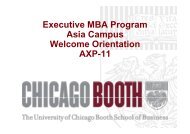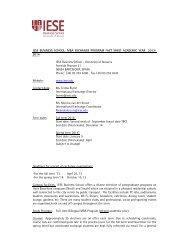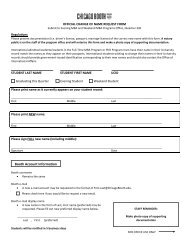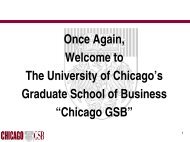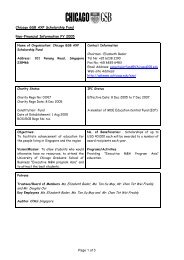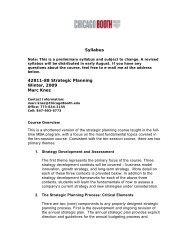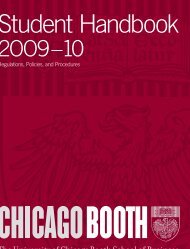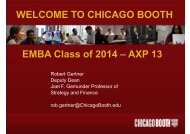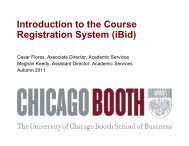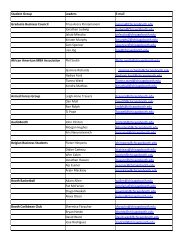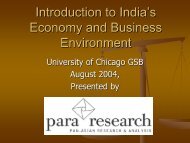master of business administration (mba) 2009 - Chicago Booth Portal
master of business administration (mba) 2009 - Chicago Booth Portal
master of business administration (mba) 2009 - Chicago Booth Portal
You also want an ePaper? Increase the reach of your titles
YUMPU automatically turns print PDFs into web optimized ePapers that Google loves.
MASTER OF BUSINESS<br />
ADMINISTRATION (MBA)<br />
<strong>2009</strong>
A message from the director<br />
Wits Business School (WBS) is well known for providing its students<br />
with a solid, relevant and globally competitive <strong>business</strong> education.<br />
It has been a premier choice <strong>of</strong> students and employers for 40 years.<br />
Situated in the centre <strong>of</strong> <strong>business</strong> in South Africa it prides itself on<br />
counting some <strong>of</strong> the country’s top <strong>business</strong> people among its Alumni.<br />
The MBA<br />
and PDM<br />
programmes<br />
are designed to<br />
equip our students<br />
with the skills<br />
and knowledge<br />
that will make<br />
them truly<br />
competitive<br />
in the job market<br />
as well as<br />
giving them<br />
the confidence<br />
to venture out<br />
on their own<br />
Pr<strong>of</strong>essor Mthuli Ncube<br />
Director<br />
The MBA and PDM programmes are designed to equip our students<br />
with the skills and knowledge that will make them truly competitive in<br />
the job market as well as giving them the confidence to venture out on<br />
their own.<br />
WBS is accredited by a number <strong>of</strong> leading international organisations<br />
including the Association <strong>of</strong> Master Business Administration (AMBA)<br />
and the Programme in International Management (PIM). The school is<br />
also a founding member <strong>of</strong> the South African Association <strong>of</strong> Business<br />
Schools.<br />
Our faculty prides itself on its diversity and international expertise.<br />
WBS teaching methodology is interactive and grounded in both theory and<br />
real-life <strong>business</strong> cases. We select our students carefully to ensure that they have<br />
the ability to pass the course as well as making a meaningful contribution in<br />
the classroom.<br />
Our vision for the future is to meet the changing needs <strong>of</strong> <strong>business</strong> and society<br />
by ensuring that our curriculum remains relevant to the needs <strong>of</strong> our students<br />
and the market; raising WBS’s international pr<strong>of</strong>ile as well as increasing our<br />
presence in Africa and continuing to produce high quality graduates who can<br />
play their part in our expanding economy.<br />
If you are keen to pursue a career in <strong>business</strong> and believe you have what it<br />
takes to thrive in a competitive environment we would love to hear from you.<br />
Pr<strong>of</strong>essor Mthuli<br />
Ncube<br />
Pr<strong>of</strong>essor Mthuli Ncube<br />
Director: Wits Business School<br />
MASTER OF BUSINESS ADMINISTRATION (MBA)<br />
1
Frequently asked questions<br />
Why should I choose Wits Business School (WBS)<br />
Research has shown that people consider the following factors when choosing a<br />
<strong>business</strong> school:<br />
• The prestige <strong>of</strong> the parent university and the prestige <strong>of</strong> the <strong>business</strong><br />
school<br />
WBS forms part <strong>of</strong> the Faculty <strong>of</strong> Commerce, Law and Management <strong>of</strong> Wits<br />
University. For over eighty five years; Wits has <strong>of</strong>fered an education <strong>of</strong> the highest<br />
quality. It is recognised as a world-class university <strong>of</strong>fering degrees that are<br />
internationally accepted. As one <strong>of</strong> the best universities in the world, Wits<br />
recognises the importance <strong>of</strong> being part <strong>of</strong> creative, innovative intellectual<br />
networks. At Wits we therefore recognise the need to establish and maintain<br />
existing local and global partnerships and to play an active role in fostering<br />
intellectual communities. As a result <strong>of</strong> this; WBS continues to have close links<br />
with other <strong>business</strong> schools such as INSEAD and the London Business School.<br />
Zimasa Koyana<br />
Manager:<br />
Academic Programmes<br />
The student mix<br />
is just<br />
as important<br />
as the syllabus<br />
on an MBA<br />
programme.<br />
WBS is uniquely<br />
positioned<br />
to attract the<br />
best students<br />
• Published ranking , accreditations and memberships<br />
WBS is acknowledged as one <strong>of</strong> the leading <strong>business</strong> schools on the continent;<br />
being ranked for a number <strong>of</strong> years by the Pr<strong>of</strong>essional Management Review as the leading<br />
<strong>business</strong> school in Africa and having its Master <strong>of</strong> Business Administration (MBA) degree<br />
ranked number one in the South African Financial Mail for the sixth consecutive year. It is<br />
one <strong>of</strong> seventeen South African <strong>business</strong> schools to have their MBA qualification <strong>of</strong>ficially<br />
accredited by the Council on Higher Education (CHE) and one <strong>of</strong> the two schools in South<br />
Africa who have their MBA qualifications internationally accredited by the Association <strong>of</strong><br />
MBAs (AMBA 2005). It is also one <strong>of</strong> the few Schools in Africa invited to become a member<br />
<strong>of</strong> US-based Graduate Management Admissions Council Programmes (GMAC).<br />
• Quality <strong>of</strong> Faculty<br />
Lecturers on the programme are known for their outstanding teaching abilities, <strong>business</strong> and<br />
research experience. Our faculty prides itself in its diversity, local and international expertise.<br />
• Quality <strong>of</strong> students<br />
The student mix is just as important as the syllabus on an MBA programme. WBS is uniquely<br />
positioned to attract the best students. Therefore our students do not only benefit from the<br />
School‘s outstanding local and international lecturers; but also from the wealth <strong>of</strong> experience<br />
and viewpoints brought to the classroom by peer groups and classmates: all <strong>of</strong> whom have<br />
been carefully selected.<br />
• Ability <strong>of</strong> the school to improve both their technical and s<strong>of</strong>t skills<br />
WBS <strong>of</strong>fers an interactive approach to management education, which has proven over many<br />
years to be highly effective in empowering individuals to handle <strong>business</strong> challenges, both<br />
locally and internationally. The case study teaching methodology creates the space for<br />
students to exercise analytical and decision-making skills and, at the same time, encourages<br />
students to respect differing opinions, challenge their own thinking and question<br />
conventional wisdom.<br />
MASTER OF BUSINESS ADMINISTRATION (MBA)<br />
2
• International study trips and student exchanges<br />
Part <strong>of</strong> studying towards an MBA degree is to gain an international perspective on <strong>business</strong>.<br />
WBS’s MBA has the most extensive Student Exchange Programme in Africa, through<br />
Programme in International Management (PIM), a network <strong>of</strong> over fifty prestigious <strong>business</strong><br />
schools in the world, and reciprocal exchange agreements with a further ten. WBS is the<br />
only <strong>business</strong> school in Africa to have been admitted to PIM. The deciding factor in<br />
admitting a <strong>business</strong> school to PIM is whether the school has the same quality and reputation<br />
<strong>of</strong> the international partner universities; and is able to attract foreign students to study.<br />
One <strong>of</strong> the electives <strong>of</strong>fered on the MBA is an international study tour. These visits are<br />
designed to expose students to leading companies in the countries visited; as well as to<br />
develop an appreciation <strong>of</strong> their economies. These international <strong>business</strong> trips are considered<br />
by many students to be a major highlight <strong>of</strong> the MBA. They are both fun and educational.<br />
Will a WBS MBA equip me with the skills and competencies that are valued by<br />
employers<br />
Organisations employ MBA graduates primarily for their <strong>business</strong> management knowledge<br />
and their ability to apply that knowledge, along with their technical skills, to any function<br />
necessary to reach organisational goals. Therefore our MBA programme is designed to equip<br />
our students with skills and competencies that form part <strong>of</strong> the content ‘requirements’ <strong>of</strong><br />
daily managerial work by <strong>of</strong>fering modules that enhance decision-making skills, human<br />
capital management skills, strategic thinking, innovation skills, <strong>administration</strong> and control<br />
skills, global awareness, operations management skills and the skills <strong>of</strong> how to maximise the<br />
value created by technology.<br />
WBS’s MBA<br />
is focussed<br />
on developing<br />
your leadership<br />
potential<br />
by equipping you<br />
with the<br />
management<br />
tools required<br />
to become<br />
anything you want<br />
Does the WBS <strong>of</strong>fer internship opportunities<br />
WBS is the first South African <strong>business</strong> school to introduce an internship option for the fulltime<br />
class. MBA full-time students have an option <strong>of</strong> completing a two-month internship in<br />
a <strong>business</strong> organisation. The aim <strong>of</strong> this internship is to provide our students with unique<br />
opportunity to integrate their academic learning with real work experience; in a manner that<br />
facilitates critical reflection and deep learning.<br />
Does the WBS <strong>of</strong>fer funding for MBA studies<br />
WBS grants a limited number <strong>of</strong> bursaries for full-time studies in MBA degrees. For conditions<br />
for awarding a bursary please see page 21 in this brochure.<br />
Is it compulsory for me to sit for the Graduate Management Admission Test (GMAT)<br />
From 2008 all MBA applicants are required to sit for the GMAT. For more information on<br />
how to book, prepare and sit for the GMAT; please visit www.MBA.com or call 011 655 7224.<br />
Do I qualify to apply for an MBA<br />
Applicants who apply for the MBA programme and hold an undergraduate degree; have four<br />
years working experience and achieve a satisfactory result on their GMAT will be<br />
considered. We consider a small number <strong>of</strong> exceptional individuals who do not have<br />
degrees.<br />
MASTER OF BUSINESS ADMINISTRATION (MBA)<br />
3
Wits Business School turns 40<br />
Two generations <strong>of</strong> WBS MBA testimonies<br />
Wits Business School (WBS) is celebrating its 40th Anniversary, having been established<br />
since 1968. In the 40 years we have seen two generations <strong>of</strong> fathers and sons completing an<br />
MBA at WBS.<br />
Campbell Bomela<br />
Campbell Bomela<br />
MBA PT 1981/1983<br />
MBA PT 1981/1983<br />
“In the 80’s the management and control <strong>of</strong> companies was preserved only for<br />
white males, but the WBS MBA qualification made it possible for my rapid<br />
progression through the corporate ladder up to executive level. I am the Executive<br />
Director: Group Service for the JSE-listed Staffing Solutions Company, Adcorp<br />
Holdings. Adcorp is a R4.4 billion turnover company, employing 2 300 permanent<br />
and 65 000 contract employees. In the job <strong>of</strong> Executive Director: Group Services;<br />
I lead Adcorp's Human Resources Team; the Strategic Research Team and the<br />
Corporate Social Investment Team. I was previously Managing Director <strong>of</strong><br />
the Black Management Forum Investments Company Limited, a company which I lead from<br />
a no-value base in 1999 to a stage where it had acquired significant stakes in a number <strong>of</strong><br />
large South African companies: including the then national lotteries operator, Uthingo<br />
Management Services; in a gaming company, Gold Reef City Casino; in a global financial<br />
service company, Computershare SA and in a mining resources company, Matlapeng<br />
Holdings.”<br />
Loyiso Bomela<br />
MBA FT 2008<br />
Loyiso Bomela<br />
MBA FT 2008<br />
“After matriculating in 1998, I was accepted into the University <strong>of</strong> the Free State for<br />
a MBChB degree. Upon my completion I did my internship at the Helen Joseph<br />
Hospital and in 2007 finished my community service at the Mmametlhake Hospital<br />
in Mpumalange Province. After developing an interest in the management aspects<br />
<strong>of</strong> the health sector, as well as a long standing interest in the <strong>business</strong> sector, I then<br />
decided to to pursue an MBA degree. As advised by my father, WBS was the<br />
obvious choice, as the leading <strong>business</strong> school in the country. He had also done<br />
his MBA at WBS and was <strong>of</strong> the opinion that it prepared and equiped him with the<br />
necessary skills and knowledge required for the <strong>business</strong> sector. I was fortunate to<br />
be accepted, as this was the only <strong>business</strong> school that I had applied to and<br />
I haven’t been disappointed since that day. As I had only two years <strong>of</strong> working experience,<br />
I found that classroom interaction and lectures were very beneficial in the enlightenment <strong>of</strong><br />
a “lost” soul such as myself. I enjoyed the lectures and learned a great deal. I have also been<br />
privileged to meet amazing and talented individuals, who have become my friends and<br />
hopefully, future <strong>business</strong> partners. The WBS process <strong>of</strong> “Sculpting Global Leaders in Africa”<br />
is an intense one and I must say that the MBA Programme has been challenging. If learning<br />
and the expansion <strong>of</strong> your thought process stimulates and interests you, I would recommend<br />
WBS as the obvious choice.”<br />
MASTER OF BUSINESS ADMINISTRATION (MBA)<br />
4
Dr Izak Fourie<br />
MBA PT 1989/1991<br />
“I had been in private practice as a specialist urologist for more than ten years<br />
when I became progressively more interested in health economics and health<br />
systems management. I was then <strong>of</strong>fered a position with one <strong>of</strong> the major hospital<br />
groups and it was on the advice <strong>of</strong> senior executives <strong>of</strong> the hospital group that I<br />
decided to do a part-time MBA at the WBS. I thoroughly enjoyed the MBA<br />
experience and made a number <strong>of</strong> good friends from amongst my fellow students<br />
and faculty members. For a person who had no previous <strong>business</strong> training or<br />
exposure the WBS MBA was an extremely useful and quick learning curve without which<br />
I’m sure the transition from clinical medicine to senior management would have been much<br />
slower and more difficult. When my son (Henri) indicated that he also would like to become<br />
more involved in the <strong>business</strong> side <strong>of</strong> IT, I had no hesitation in recommending a WBS MBA<br />
to him.”<br />
Dr Izak Fourie<br />
MBA PT 1989/1991<br />
Henri Fourie<br />
MBA PT 2005/2008<br />
Graduated Cum Laude<br />
“My decision to enrol on the MBA Programme at WBS was driven primarily by my<br />
desire to further both my career and my academic studies. That said, I chose WBS<br />
as an institution due to the fact, as the second generation <strong>of</strong> my family to sign up<br />
to complete an MBA from WBS, I had insight into both the pedigree <strong>of</strong> WBS as a<br />
learning institution and the quality <strong>of</strong> the lecturers and courses on <strong>of</strong>fer. What I<br />
have learnt on the MBA Programme has indeed been invaluable and will no doubt<br />
be <strong>of</strong> great value to me in my career and, indeed, in all aspects <strong>of</strong> my life moving<br />
forward. For me the programme’s value lies not only in the academic content and<br />
learning, but equally in the good friends that you make as well as the network <strong>of</strong> <strong>business</strong><br />
contacts you manage to build up over the duration <strong>of</strong> your MBA degree.”<br />
Henri Fourie<br />
MBA PT 2005/2008<br />
Graduated Cum Laude<br />
MASTER OF BUSINESS ADMINISTRATION (MBA)<br />
5
Gaining international perspective<br />
Part <strong>of</strong> studying towards a Master <strong>of</strong> Business Administration (MBA) degree is to<br />
gain an international perspective <strong>of</strong> <strong>business</strong>. Wits Business School’s (WBS’s) MBA<br />
has the most extensive Student Exchange Programme in Africa, through a network<br />
<strong>of</strong> over 50 prestigious <strong>business</strong> schools in the world: and reciprocal exchange<br />
agreements with a further ten.<br />
Pr<strong>of</strong>essor John Luiz<br />
Director: International<br />
Programmes<br />
WBS is a member <strong>of</strong> the Programme in International Management (PIM) which<br />
defines itself as “an international consortium <strong>of</strong> higher education institutions;<br />
outstanding in their field and delivering a graduate-equivalent degree in<br />
management”. The PIM network has more than 50 leading international <strong>business</strong> schools –<br />
such as Duke University, Cornell, UCLA, University <strong>of</strong> <strong>Chicago</strong>, Indiana, North Carolina, HEC<br />
and Warwick.<br />
“The WBS is uniquely<br />
positioned to <strong>of</strong>fer<br />
our students<br />
opportunities<br />
for international<br />
study at leading<br />
<strong>business</strong> schools<br />
around the world.<br />
Pr<strong>of</strong>essor John Luiz,<br />
Director International<br />
Programmes<br />
WBS is the only <strong>business</strong> school in Africa to have been admitted to PIM. The deciding factor<br />
in admitting a <strong>business</strong> school to PIM is whether it has the same quality and reputation as<br />
the international partner universities and is able to attract foreign students to study.<br />
There is a demand from South African students to study, especially in the United States and<br />
Europe, for between three to six months, but there is also strong interest from foreign<br />
students to spend between three to six months at the WBS. Our growing academic<br />
reputation underpins the steady growth in numbers arriving from abroad. The Exchange<br />
Programme is highly attractive for WBS students; and without exception they have done very<br />
well at the foreign <strong>business</strong> schools. Students pay no tuition fees to the international partner<br />
<strong>business</strong> school. This is a real benefit for our students as these fees are far in excess <strong>of</strong> those<br />
charged locally.<br />
International <strong>business</strong> trips<br />
One <strong>of</strong> the electives <strong>of</strong>fered on the MBA is an international study tour. For example, in 2006<br />
the group visited China and Hong Kong; and in 2007 India and Dubai. The visits are<br />
designed to expose students to leading companies in the countries visited, as well as to<br />
develop an appreciation <strong>of</strong> their economies. In 2008 a group <strong>of</strong> 40 students will visit<br />
Singapore, Thailand and Malaysia. These international <strong>business</strong> trips are considered by many<br />
students to be a major highlight <strong>of</strong> the MBA. They are both fun and educational.<br />
MASTER OF BUSINESS ADMINISTRATION (MBA)<br />
6
International<br />
exchange<br />
During 2008 Wits<br />
Business School (WBS)<br />
hosted exchange<br />
students from many top<br />
international Business<br />
Schools; some <strong>of</strong> which<br />
are listed below:<br />
• HEC School <strong>of</strong><br />
Management, France<br />
• Bocconi University,<br />
Italy<br />
• Cornell University,<br />
USA<br />
• Warwick Business<br />
School, UK<br />
• University <strong>of</strong> Cologne<br />
(Kohn), Germany<br />
• Duke University, USA<br />
• University <strong>of</strong><br />
<strong>Chicago</strong>, USA<br />
• Kenan Flagler<br />
Business School,<br />
University <strong>of</strong> North<br />
Carolina, USA<br />
• St Gallen, Switzerland<br />
• UCLA Anderson<br />
School <strong>of</strong><br />
Management,<br />
California, USA<br />
MASTER OF BUSINESS ADMINISTRATION (MBA)<br />
7
Career management perspective<br />
Wits Business School (WBS) is the only <strong>business</strong> school in South Africa that <strong>of</strong>fers<br />
its students comprehensive career management services including career<br />
workshops, career coaching, graduate recruitment and advice on job search<br />
strategies. All these services are free <strong>of</strong> charge and students may opt to make use<br />
<strong>of</strong> all or just some <strong>of</strong> them.<br />
Viveka Christierson<br />
Career Counsellor,<br />
HR lecturer and<br />
Director <strong>of</strong> Academc<br />
Programmes<br />
In the Career Management Workshop; students have the opportunity to explore<br />
their career needs, career interests and work style preferences. They are taught<br />
how to brand and market themselves successfully by means <strong>of</strong> networks, CVs,<br />
covering letters and interviews. Students are also given some guidelines on how to manage<br />
their future career development. The Interview Skills Workshop has been designed to help<br />
students to prepare themselves for all types <strong>of</strong> employment interviews. In the Dual Career<br />
Couples Workshop MBA students are invited to bring their partners and explore the<br />
challenges and rewards facing the Dual Career Couple.<br />
Career coaching with the WBS Career Counsellor is available to all students who<br />
have attended the Career Management Workshop.<br />
Individual consultations on employment opportunities, job search strategies,<br />
résumé and CV formulation and critique; as well as interview skills are available by<br />
appointment with the WBS Graduate Recruitment Officer.<br />
Charisse Drobis<br />
Graduate Recruitment<br />
Officer,<br />
Deputy Director:<br />
International<br />
Programmes<br />
Graduate Recruitment is an ongoing activity at WBS facilitated by the Graduate<br />
Recruitment Office. It peaks in the period August to October in the Graduate<br />
Recruitment Programme: to which a large number <strong>of</strong> employers are invited to present their<br />
companies to the WBS students. A cocktail party, at which company representatives and<br />
students are able to network, usually follows these presentations. Application forms and CVs<br />
can be channelled through the Graduate Recruitment Office to the recruiting companies, and<br />
many first interviews take place on campus.<br />
MASTER OF BUSINESS ADMINISTRATION (MBA)<br />
8
Internship programme<br />
WBS is the first<br />
South African<br />
<strong>business</strong> school<br />
to introduce<br />
an internship<br />
option for full<br />
time MBA<br />
students.<br />
The internship<br />
is <strong>of</strong>fered<br />
as an elective<br />
and carries<br />
a weighting<br />
<strong>of</strong> two elective<br />
credits<br />
out <strong>of</strong> five<br />
The Master <strong>of</strong> <strong>business</strong> Administration (MBA) Full-Time Internship Programme at<br />
Wits Business School (WBS) provides our students with a unique opportunity to<br />
integrate their academic learning with real work experience; in a manner that<br />
facilitates critical reflection and deep learning. The programme is managed by our<br />
Graduate Recruitment Officer, Charisse Drobis, who facilitates the process from<br />
initial internship briefing through to final debriefing and evaluation. Moreover an<br />
extensive Career Management Programme underpins the Internship Programme;<br />
providing the necessary support with respect to career counselling; career<br />
preference pr<strong>of</strong>iling; career management; job search skills and interview<br />
workshops; employment strategy consultations; CV and cover letter critique and mock<br />
interviews. This places the students in a position <strong>of</strong> confidence and readiness to exploit the<br />
exciting opportunities on <strong>of</strong>fer.<br />
Organisational support emerges from an appreciation <strong>of</strong> the value that MBA students are<br />
able to add within a relatively short period <strong>of</strong> time. The students bring new thinking to the<br />
organisations and energise the environment with their enthusiasm and objective, yet creative,<br />
problem-solving abilities. They are expected to add value and this value has been assessed<br />
as both real and tangible by the participating organisations.<br />
The Internship Programme provides employers with an ideal forum for engaging potential<br />
employees.<br />
The Internship Programme is supported by intra-organisational mentors and supervisors.<br />
WBS provides further support for the interns through a tutor system; WBS faculty provide<br />
both telephonic and on-site guidance and support to our students.<br />
Charisse Drobis<br />
Graduate Recruitment<br />
Officer,<br />
Deputy Director:<br />
International<br />
Programmes<br />
MASTER OF BUSINESS ADMINISTRATION (MBA)<br />
9
MASTER OF BUSINESS ADMINISTRATION (MBA)<br />
10
The Case Centre – A unique advantage<br />
As the only<br />
<strong>business</strong> school<br />
in South Africa<br />
to have<br />
a dedicated<br />
case centre;<br />
WBS<br />
is committed<br />
to producing topquality<br />
South<br />
African case<br />
studies that<br />
students will<br />
remember;<br />
and be able<br />
to draw from long<br />
after they have<br />
left the school<br />
What would you do if you were the marketing director <strong>of</strong> MTN having to roll out a<br />
uniform marketing strategy throughout Africa and the branches in all the countries<br />
were fiercely protective <strong>of</strong> their turf What is there to learn from Maria Ramos about<br />
how she set about turning around Transnet And did she get it all right Leisurenet<br />
appeared to have all the governance processes in place; yet still it was destroyed by<br />
corruption. Why was this And what could the developers <strong>of</strong> eNaTIS have done to<br />
avoid the system crash that brought the whole traffic registration process to a halt<br />
in April 2007 Indeed, could they have done anything<br />
These are the kinds <strong>of</strong> issues that Wits Business School (WBS) cases give students the<br />
opportunity to grapple with and learn from. Case studies brings real-world <strong>business</strong><br />
challenges into the classroom for students to address. They facilitate participant-centred<br />
learning; where students can bring their own experiences into the classroom and learn from<br />
each other. They allow students to apply the latest theory in solving practical <strong>business</strong><br />
problems. They create the space for students to exercise analytical and decision-making<br />
skills and at the same time they encourage students to respect differing opinions; challenge<br />
their own thinking and question conventional wisdom.<br />
The case method creates a context for discussing and analysing <strong>business</strong> processes that is<br />
seldom generated using traditional teaching methods; and WBS therefore uses case studies<br />
extensively in its classrooms.<br />
While WBS uses many international cases in its courses; the real-world decisions, companies<br />
and scenarios depicted in these cases are not always applicable in the South African context.<br />
Moreover, the South African <strong>business</strong> environment has unique characteristics that cannot be<br />
depicted in cases set in international contexts. As a consequence, as far back as 1993, WBS<br />
established its own case centre to produce South African cases; retaining a Harvardtrained<br />
case writer to help to develop the specialist skills that we needed.<br />
Today WBS has a team <strong>of</strong> case writers who work with academics to produce cases<br />
<strong>of</strong> the highest standard and its growing collection <strong>of</strong> cases is being used not only<br />
in WBS classrooms, but also in other South African and international universities<br />
and <strong>business</strong> schools. Its collection includes cases on companies as diverse as<br />
AngloGold, SABMiller, Nando’s, Discovery, Harley Davidson®, Avis, Young<br />
Designer’s Emporium and Capitec Bank. The cases cover all areas <strong>of</strong> <strong>business</strong> and<br />
management; including strategy, organisational design and development, entrepreneurship,<br />
internationalisation, operations management and human resources, and are highly regarded<br />
for the quality <strong>of</strong> learning that they generate.<br />
WBS is now the<br />
largest producer<br />
<strong>of</strong> case studies<br />
in Africa and<br />
our repertoire<br />
<strong>of</strong> cases is<br />
growing<br />
continually<br />
Claire Beswick<br />
Senior Case writer<br />
As the only <strong>business</strong> school in South Africa to have a dedicated case centre, WBS is<br />
committed to producing top quality South African cases studies that students will remember<br />
and be able to draw from long after they have left the school.<br />
MASTER OF BUSINESS ADMINISTRATION (MBA)<br />
11
Wits Business School Faculty<br />
PROFESSORS<br />
Pr<strong>of</strong>essor Russell Abratt,<br />
BCom(Witwatersrand), MBA<br />
DBA(Pretoria).<br />
PROFESSORS<br />
Pr<strong>of</strong>essor<br />
Fred Ahwireng-Obeng<br />
BSc(Hons), AgEcon(Ghana),<br />
PhD(Leeds, United Kingdom)<br />
DIRECTOR<br />
Pr<strong>of</strong>essor<br />
Mthuli Ncube<br />
PhD(Cambridge,<br />
United Kingdom)<br />
Pr<strong>of</strong>essor David Dickinson<br />
BAHons(Sheffield), DipEc<br />
Distinction (Sussex University,<br />
United Kingdom),<br />
MPhl(Cambridge),<br />
PhD(Cambridge, United<br />
Kingdom)<br />
Pr<strong>of</strong>essor Gillian Marcelle<br />
BSc(Econ), MBA, DPhil(Sussex,<br />
United Kingdom)<br />
Pr<strong>of</strong>essor John Luiz<br />
MCom(Witwatersrand),<br />
PhD(Stellenbosch)<br />
Pr<strong>of</strong>essor Kalu Ojah<br />
PhD(St Louis, United States <strong>of</strong><br />
America)<br />
WBS faculty<br />
is one <strong>of</strong> the top<br />
ranked schools<br />
Internationally<br />
in terms<br />
<strong>of</strong> the diversity<br />
<strong>of</strong> its faculty;<br />
drawing<br />
its academics<br />
from all corners<br />
<strong>of</strong> the world<br />
Pr<strong>of</strong>essor Rasoava<br />
Rijiamampianina<br />
DSSC, DECSA(Madagascar),<br />
MBA(Otaru, Japan),<br />
DBA(Hokkaido University,<br />
Japan)<br />
SENIOR LECTURERS<br />
Dr Terri Carmichael<br />
BSc(Hons) MMHR,<br />
PhD(Witatersrand)<br />
Dr Ge<strong>of</strong>f Heald<br />
BSocSc(UCT), BusAdHons,<br />
MBA(Stellenbosch),<br />
PhD(Witwatersrand)<br />
Pr<strong>of</strong>essor Louise Whittaker<br />
BCom(Witwatersrand),<br />
MCom(Witwatersrand),<br />
PhD(Pretoria)<br />
Dr Ge<strong>of</strong>f Bick<br />
BSc(Elect Eng)(UCT),<br />
BCom(UNISA),<br />
MBA(UC, Berkeley, United<br />
States <strong>of</strong> America),<br />
DPhil(University <strong>of</strong><br />
Johannesburg), CM(SA)<br />
Dr Christoph Maier<br />
Licentiate in Business<br />
Administration, DBA(University<br />
<strong>of</strong> St. Gallen, Switzerland)<br />
Dr Thabang Mokoateli-<br />
Mokote<br />
PhD(Cranfield, United<br />
Kingdom)<br />
Dr Thabo Mosala<br />
MSc(Rhodes), MBL(Unisa),<br />
MPhil(Pretoria),<br />
PhD(Rushmore, United States<br />
<strong>of</strong> America)<br />
MASTER OF BUSINESS ADMINISTRATION (MBA)<br />
12
Mark J Peters<br />
Grad Dip, CoD, CM(SA),<br />
F Inst D, MBA(Henley, United<br />
Kingdom)<br />
Mike T H Pycraft<br />
BSc(Eng)(Manchester, United<br />
Kingdom), MBL(Unisa)<br />
Dr Grant Sieff<br />
BA,BSc(Hons), MA,<br />
MBA(Witwatersrand),<br />
DPhil(University <strong>of</strong><br />
Johannesburg<br />
Conrad Viedge<br />
BA(Hons), MA(Witwatersrand)<br />
LECTURERS<br />
Viveka Christierson<br />
BA(Hons),<br />
MA(Ind Psych)(Witwatersrand)<br />
Dr Anthony Stacey<br />
BSc(UCT),<br />
MBA(Witwatersrand),<br />
PhD(Witwatersrand)<br />
Rabelani Dagada<br />
MEd(University <strong>of</strong><br />
Johannesburg),<br />
MCom(Witwatersrand)<br />
The Faculty<br />
maintain close<br />
ties with<br />
the <strong>business</strong><br />
community<br />
through<br />
consulting<br />
and teaching<br />
in executive<br />
programmes<br />
Dr Dominik Heil<br />
Diplom Kaufmann(Munich,<br />
Germany), PhD(Witswaterand)<br />
Michael Mcete<br />
BAdmin(Unisa),<br />
BEd(Witwatersrand), HipEd<br />
(Witwatersrand), LLM(UPE),<br />
MA(HR&LR)(UPE)<br />
Mkhethwa Mkhize<br />
BCom(Hons), MBA(Natal)<br />
Yvonne Saini<br />
BA(UNZA), MBA(Illinois,<br />
Champaign – Urbana, United<br />
States <strong>of</strong> America)<br />
Antony Soicher<br />
MBA(Witwatersrand)<br />
Courtney Sprague<br />
BA(Michigan State University),<br />
MA(Boston University, United<br />
States <strong>of</strong> America)<br />
Douglas Taylor<br />
BCom(Hons)(Unisa),<br />
MBA(Witwatersrand)<br />
Sean Temlett<br />
BA(Hons)(Witwatersrand),<br />
MBA(Witwatersrand)<br />
MASTER OF BUSINESS ADMINISTRATION (MBA)<br />
13
Wits Business School Faculty continued<br />
WBS teaching<br />
methodology is<br />
based on a<br />
particitative<br />
international<br />
approach<br />
VISITING PROFESSOR<br />
Pr<strong>of</strong>essor Mukul P Gupta<br />
BSc(University <strong>of</strong> Rajasthan, Jaipur),<br />
MBA(Gold Medallist <strong>of</strong> University <strong>of</strong><br />
Rajasthan Jaipur), PhD(Rajasthan, India).<br />
Dr Samuel Jonah KBE, Diploma<br />
(Camborne School <strong>of</strong> Mines, Cornwall,<br />
England), MSc Mine Management (Imperial<br />
College, London University).<br />
Pr<strong>of</strong>essor Désiré Vencatachellum,<br />
Magistère ingénieur économiste(Université<br />
d’Aix-Marseille II), PhD(économie),<br />
(Montreal).<br />
Pr<strong>of</strong>essor Vijay Mahajan<br />
BTech(Indian Institute <strong>of</strong><br />
Technology)(Kanpur), MSChem,<br />
PhD(Management)(University <strong>of</strong> Texas,<br />
Austin).<br />
PROFESSOR EMERITUS<br />
Pr<strong>of</strong>essor Neil Duffy, BCom(UCT),<br />
MBL(Unisa), DBL(Unisa), FCSSA.<br />
INTERNATIONAL FACULTY<br />
Pr<strong>of</strong>essor Ron Amey, BA(Econ), MBA,<br />
CEng, FIMechEng, FIM.<br />
Pr<strong>of</strong>essor Peter Brews, BCom, LLB,<br />
HDip(Company Law)(Witwatersrand),<br />
MSIA(Purdue), PhD(Witwatersrand,<br />
Pittsburgh).<br />
Pr<strong>of</strong>essor Norman Chorn, BA(UCT),<br />
HDPM, MBA, PhD(Witwatersrand).<br />
Pr<strong>of</strong>essor Nitendor Dhillon,<br />
Pr<strong>of</strong>essor Saul Klein, BA(Hebrew<br />
University), MBA, PhD(Toronto).<br />
Pr<strong>of</strong>essor Keith Yeomans, BA MSc(Keele),<br />
PhD(Aston), DipEd(Keele), FSS, CStat.<br />
PART-TIME LECTURERS<br />
Richard Anderson, MBA(Cape Town),<br />
CA(SA).<br />
Lawrence Beder, M Com(Witswatersrand)<br />
BCom(Hons)(Unisa).<br />
Dr Terry Berkow, BAEcon(Witswatersrand),<br />
MBA(UCT), DBA(Stellenbosch).<br />
Anthony Bizos, BSc(Hons)<br />
(Witswatersrand), MBA(Cambridge).<br />
Vicky Bronstein, BA(Hons),<br />
LLB(Witswatersrand), LLM(London).<br />
Peter Christie, BA(Hons),<br />
MA(Witswatersrand).<br />
Richard Cohen,<br />
BCom(Hons)(Witwatersrand),<br />
MCom(Hons)(Witwatersrand), CA(SA).<br />
Sid Cohn, BSc(Stell), MBA(Cape Town).<br />
Maryse Curutchet, BCom(Unisa),<br />
MBA(Cranfield, United Kingdom).<br />
Peter Draper, MCom(Natal).<br />
Charisse Drobis, BA(Witwatersrand).<br />
Adam Gordon, BA(Hons)(Witwatersrand),<br />
MSc(University <strong>of</strong> Houston), MBA(Insead,<br />
Wharton).<br />
Liora Gross, MA(Witwatersrand),<br />
MBA(Witwatersrand)(Cum Laude).<br />
Karen Hinrichs, BA(Hons),<br />
Masters (Pietermaritzburg).<br />
Tertia Jacobs, BCom(Hons)(Witwatersrand),<br />
BusEcon(RAU).<br />
Dimitri Joannides, BSc(Hons), MBA.<br />
Lisa Kinnear, BA, HDE(Natal),<br />
MBA(Witwatersrand).<br />
Koos Koen, PrEng, BSc(Eng), FCSSA,<br />
MECSA, MM(HR)(Witwatersrand).<br />
Zimasa Koyana, BA(Hons)(Natal),<br />
MBA(Witwatersrand).<br />
Robin Lee, BA(Hons)(Natal),<br />
PhD(Witwatersrand).<br />
Kevin Lings, BComHons(Witwatersrand).<br />
Helen McIntee, BA(Industrial Psychology),<br />
MBA(Witwatersrand), CM(SA).<br />
Dr Wendy Ngoma, PhD(Witwatersrand).<br />
Neale Penman, (BCom(Hons),<br />
MBA(Witwatersrand).<br />
Clara Priester, BA(Kansas Western<br />
University), MBA(University <strong>of</strong> <strong>Chicago</strong>),<br />
Chartered Marketing (South Africa).<br />
Anton Roodt, BA, BA(Hons),<br />
MA(Potchestroom).<br />
Anton Roskam, MBA(Witwatersrand).<br />
Cynthia Schoeman, MBA (Witwatersrand).<br />
Paul Semark, BSc(Eng)(Cape Town),<br />
BA(Unisa), MM(Witwatersrand).<br />
Brad Shannon, BA(Hons)(Witwatersrand),<br />
MSocSci(Cum Laude)(Natal), MM(Cum<br />
Laude)(Witwatersrand).<br />
Herman Singh, BSc, GDE,<br />
MBA(Witwatersrand).<br />
David Thayser, CA(SA), FCMA.<br />
Ge<strong>of</strong>f Verschoor, BA(Hons)(Rhodes), MA,<br />
MBA(Witwatersrand).<br />
Merle Werbel<strong>of</strong>f, BSc(Witwatersrand),<br />
BSc (Hons)(Psychology)(Unisa),<br />
MSc(Industrial Psychology)(Witwatersrand).<br />
Natalie Witthuhn, BA(Hons),<br />
MBA(Witwatersrand).<br />
Johathan Yudelowitz, BA(Hons)(Rhodes),<br />
MM(Witwatersrand).<br />
David Zidel, MBA(Witwatersrand).<br />
MASTER OF BUSINESS ADMINISTRATION (MBA)<br />
14
Wits Business School campus facilities<br />
Wits Business School (WBS) was founded in 1968 and has grown rapidly since then.<br />
There are currently over 700 students registered on academic programmes and over<br />
1 500 executives on various short courses. Within the School there are a number <strong>of</strong> associate<br />
centres. These include the Management Development Unit, the South African Management<br />
Project and the Case Writing Centre.<br />
Lecturing Facilities<br />
WBS lecturing takes place in four buildings within the Parktown Campus. The Albert Wessels<br />
Building, completed in 1999, has almost doubled the capacity <strong>of</strong> WBS by providing three<br />
60-seat classrooms, a computer laboratory and additional syndicate rooms for group<br />
discussions. Other lecturing facilities include the 230-seat Donald Gordon auditorium and<br />
the 98-seat Investec auditorium. The Bert Wessels lecture theatre, a 70-seater ‘holographic’<br />
video conferencing room, links us to other <strong>business</strong> schools across the world. All our<br />
classrooms have state <strong>of</strong> the art audio-visual equipment and are based on the Harvard<br />
Business School model <strong>of</strong> a horseshoe shape to stimulate interaction between students and<br />
lecturers.<br />
All our buildings are maintained to a high standard and are monitored by close circuit<br />
television (CCTV).<br />
WBS campus<br />
is situated<br />
in the leafy<br />
environment<br />
<strong>of</strong> Parktown<br />
in the hub<br />
<strong>of</strong> South Africa’s<br />
<strong>business</strong><br />
community<br />
Library<br />
All our registered students and alumni have access to all the Wits Libraries with over one<br />
million volumes and 400 000 periodical volumes. The Wits Library <strong>of</strong> Management, which is<br />
in the Parktown Campus, contains more that 15 000 volumes, subscribes to over two<br />
hundred physical and several online data base journals, and includes a formidable collection<br />
<strong>of</strong> South African research accumulated over a 30 year period.<br />
Computer Facilities<br />
The computer facilities in our computer lab rank amongst the best in the country for<br />
academic institutions. The School operates on a Novell LAN which is attached to the<br />
university’s fibre optic backbone for access to the Internet. The School uses the MS Office<br />
suite <strong>of</strong> s<strong>of</strong>tware in the MS Windows environment; together with several specialist packages<br />
and online data bases. In terms <strong>of</strong> computer literacy; we expect our students to be able to<br />
use at least a spreadsheet and a word processing package.<br />
MASTER OF BUSINESS ADMINISTRATION (MBA)<br />
15
Master <strong>of</strong> Business Administration<br />
Degree details<br />
Contents<br />
Programme structure 16<br />
The Curriculum for the MBA Degree 16<br />
Internship programme 21<br />
MBA scholarships 21<br />
Entering the Wits MBA Programme 21<br />
Application checklist 28<br />
PROGRAMME STRUCTURE<br />
Three programmes are available to prospective students:<br />
• A 14-month full-time programme; equivalent to two full academic years. Principle and<br />
core courses are completed from April to November; followed by Electives and Research<br />
from January to June <strong>of</strong> the next year.<br />
During the first half <strong>of</strong> the course the class completes the Fundamental and Core<br />
courses. The second half consists <strong>of</strong> a Research Report plus five electives.<br />
• Three-year part-time programme: one commencing in January <strong>2009</strong> and one<br />
commencing in April <strong>2009</strong>. On this programme students are required to attend evening<br />
lectures on two evenings a week and on a few Saturday mornings. In addition, they must<br />
attend a four-day full-time study school at the beginning <strong>of</strong> the programme, and further<br />
study schools as may be necessary.<br />
The Fundamental and Core courses are completed in the first two years, followed by<br />
the Research Report and five electives in the third year.<br />
• A combined full-time and part-time programme over 20 months: this is designed to give<br />
students the opportunity to attend Wits Business School (WBS) on a full-time basis for<br />
the first eight months and then switch to the part-time programme for a further year;<br />
completing five electives and a research report.<br />
Wits Business School<br />
MBA Demographics<br />
MBA FULL TIME 2008<br />
DEGREES<br />
BSc 32%<br />
BEng 3%<br />
BA 13%<br />
BTech 8%<br />
•<br />
BCom BAcc 26%<br />
BOpt/BPharm/MBBch 6%<br />
Other-Build/Pharm/ND 12%<br />
THE CURRICULUM FOR THE MBA DEGREE<br />
Course Content <strong>of</strong> Business Administration<br />
Attendance courses<br />
BUSA5064<br />
Business Simulation<br />
Participants work in company teams to set up and operate <strong>business</strong>es in a new industry.<br />
They must establish the strategy <strong>of</strong> the company; establish corporate and management<br />
objectives and policies and construct a <strong>business</strong> plan. Operations involve all functions<br />
(production, R&D, marketing, finance and human resource management) and demonstrate<br />
the integrated nature <strong>of</strong> the <strong>business</strong>.<br />
• Male 61% •<br />
Female 39%<br />
BUSA5062<br />
Group Dynamics<br />
This course develops skills with regard to group and team interaction. Group Dynamic<br />
theory is interspersed with interactive learning. This course also serves as an introduction to<br />
adult and life-long interactive learning principles and processes.<br />
BUSA5065<br />
Leadership<br />
Candidates will be introduced to the concepts and components <strong>of</strong> leadership and will be<br />
expected to participate in individual and group activities which will identify, develop and<br />
consolidate leadership skills<br />
MASTER OF BUSINESS ADMINISTRATION (MBA)<br />
16
Fundamental courses<br />
BUSA5057<br />
Principles <strong>of</strong> Accounting and Finance<br />
This course will assist candidates to develop financial literacy as generalist users <strong>of</strong><br />
accounting information for the purposes <strong>of</strong> <strong>business</strong> decision making and control.<br />
On completion <strong>of</strong> the module; the candidate should know basic terminology and concepts<br />
<strong>of</strong> finance and accounting and should have successfully compiled a mental model <strong>of</strong><br />
<strong>business</strong> dynamics based on the numerical data available. In particular the candidate must<br />
know the characteristics <strong>of</strong> financial success; and be able to identify situations where these<br />
may be absent by reference to accounting and financial information.<br />
MBA PART TIME 2008-2011<br />
BUSA5058<br />
Principles <strong>of</strong> Economics<br />
This course will give an overview <strong>of</strong> <strong>business</strong> and the economy. An analysis <strong>of</strong> consumer<br />
demand and production costs in competitive environments will develop an understanding<br />
<strong>of</strong> pricing strategies in the micro-economic environment. The domestic macro-economic<br />
environment will be assessed in terms <strong>of</strong> the economy and fiscal and monetary policy.<br />
International trade and exchange rate policy and economic growth and development within<br />
an international macro-economic environment will be discussed. It includes an integrated,<br />
MBA PART TIME 2008-2010 social scientific analysis <strong>of</strong> the global, African region and South African environments <strong>of</strong><br />
or manufacturing, unique through to continuous type operations. This introduction gives an<br />
• Male 79% • Female 21% environmental link to operations and a strategic framework. Linkages to marketing, human<br />
• Male 77% •<br />
Female 23%<br />
<strong>business</strong>.<br />
BUSA5059<br />
Principles <strong>of</strong> Human Resource Management<br />
DEGREES<br />
This course develops an understanding <strong>of</strong> the human aspects <strong>of</strong> <strong>business</strong> management.<br />
It will provide insight into the factors influencing attitudes in the workplace. The ability to<br />
contribute to the design and evaluation <strong>of</strong> key human resource management processes; and<br />
a framework for understanding the function <strong>of</strong> a human resources department and its<br />
DEGREES<br />
BSc 27%<br />
practitioners will be developed. The course will also include the integration <strong>of</strong> human<br />
BSc 13%<br />
BEng 6%<br />
resource strategy and a <strong>business</strong> plan.<br />
BEng 28%<br />
BA 6%<br />
BA 5%<br />
BCompt/BAcc BEcon 29%<br />
BCom BAcc 18%<br />
•<br />
Other-Build/Pharm/ND 32%<br />
BTech 3%<br />
BUSA5060<br />
Principles <strong>of</strong> Marketing<br />
BOpt BPharm 3%<br />
•<br />
Other-LLB/MBBch/MAP 30%<br />
This course will introduce candidates to the marketing concept. Marketing research and<br />
information systems, consumer behaviour, market segmentation and target market selection<br />
will be discussed. Product, distribution, pricing and promotion policy will be discussed as<br />
well as the integration <strong>of</strong> the marketing mix.<br />
BUSA5061<br />
Principles <strong>of</strong> Operations Management<br />
The ability to use good judgement in any type <strong>of</strong> operating environment is important: service<br />
resources and accounting / finance will be emphasised.<br />
BUSA5056<br />
Principles <strong>of</strong> Strategic Management<br />
The purpose <strong>of</strong> this course is to give candidates a basic understanding <strong>of</strong> the role <strong>of</strong> strategy<br />
in an organisation. Basic tools for the strategic analysis <strong>of</strong> the external and internal<br />
environment <strong>of</strong> the organisation will be presented. Candidates will also develop a general<br />
understanding <strong>of</strong> the strategic thinking process.<br />
MASTER OF BUSINESS ADMINISTRATION (MBA)<br />
17
Core courses<br />
BUSA5100<br />
Data and Decision Making<br />
This course is designed to broaden and deepen the student’s understanding <strong>of</strong> the analytical<br />
techniques used to solve <strong>business</strong> problems in management situations. Students learn to<br />
apply statistical theory by means <strong>of</strong> s<strong>of</strong>tware packages, where appropriate, to problems<br />
involving estimation; simulation and queuing; correlation and regression and forecasting.<br />
It is a practical course and on completion the student should be able to use or to supervise<br />
the use <strong>of</strong> the techniques covered.<br />
BUSA5199<br />
Finance<br />
This course covers the management <strong>of</strong> working capital; financial analysis; the time value <strong>of</strong><br />
money; capital budgeting; risk and return; capital structure and equity valuation. Concepts<br />
explored include operating and cash cycles; ratio analysis; benchmarking; net present value;<br />
payback internal rate <strong>of</strong> return; operating cash flows; the capital asset pricing model; the cost<br />
<strong>of</strong> capital and economic and market value added. The course is intended to expose<br />
the student to the financial techniques which drive the management <strong>of</strong> a company.<br />
BUSA5050<br />
Industrial Relations<br />
This course is divided into two sections. The inherency <strong>of</strong> conflict between capital and<br />
labour is illustrated by describing how in South Africa those respective interest groups have<br />
designed structures <strong>of</strong> governance and developed processes <strong>of</strong> negotiation and disputeresolution<br />
to shape their relationship. The influence <strong>of</strong> labour laws renegotiated in the<br />
post-1994 period are discussed; diagnostic tools are presented and case studies used to<br />
identify responses to world-class manufacturing.<br />
Characteristics <strong>of</strong> the South African labour market are discussed in the second section.<br />
This requires examination <strong>of</strong> the impact <strong>of</strong> both globalisation and the liberalising economy<br />
on the labour market; the scope <strong>of</strong> implementing institutional reform and the challenges <strong>of</strong><br />
implementing labour market policy.<br />
BUSA5048<br />
Information and Knowledge Management<br />
This course commences with an overview <strong>of</strong> the concepts, issues and technology relevant<br />
to information and knowledge management. It establishes an overarching structure in the<br />
form <strong>of</strong> information systems strategy and <strong>business</strong> planning. Key topics cover knowledge<br />
management; electronic networks, (including electronic commerce and the Internet),<br />
sourcing information systems; the management <strong>of</strong> corporate data and information; the<br />
dynamics and trends <strong>of</strong> the Information Technology industry; the organisational effects <strong>of</strong><br />
informational technology and the implementation <strong>of</strong> information systems. After the course<br />
participants are expected to be able to perform in a co-ordinating and advisory capacity in<br />
an organisation.<br />
BUSA5046<br />
Management Accounting<br />
This course presupposes awareness <strong>of</strong> the fundamentals <strong>of</strong> financial statements. The content<br />
<strong>of</strong> published financial statements is now considered in greater detail. The need for disclosure<br />
in the context <strong>of</strong> GAAP and the Companies Act is addressed. The concept <strong>of</strong> consolidations<br />
and group accounts is highlighted. One <strong>of</strong> the objectives <strong>of</strong> the course is to enable the<br />
student to read and understand financial statements <strong>of</strong> a company and thereby enhance<br />
the decision-making ability <strong>of</strong> management. More sophisticated forms <strong>of</strong> costing and<br />
control are covered as well as modern developments in managerial accounting. It aims to<br />
analyse their uses and limitations in <strong>business</strong> situations relative to management decisionmaking.<br />
MASTER OF BUSINESS ADMINISTRATION (MBA)<br />
18
BUSA5043<br />
Marketing Management<br />
This course will address marketing planning and strategy. Special topics may include:<br />
<strong>business</strong> marketing; product management and strategy; the marketing <strong>of</strong> services;<br />
distribution strategy; sales management; communication management; relationship<br />
marketing and technology and retailing.<br />
BUSA5044<br />
Operations and Technology<br />
The objective <strong>of</strong> this course is to enable the student to build simple but correctly formulated<br />
models <strong>of</strong> any operation such that useful pictures and / or conclusions can be drawn from<br />
the process. The objective is to clarify how the physical process strategies and planning<br />
(aligned to market requirements and forecasts) for an operation should always precede any<br />
Information Technology or indeed any technology choices.<br />
BUSA5045<br />
Organisational Design and Development<br />
This course will enable candidates to use appropriate outcomes to analyse and critically<br />
evaluate organisational design holistically; to identify appropriate processes to institute<br />
organisational and individual change strategies; to evaluate the implications <strong>of</strong> equity<br />
legislation and diversity management in organisations and identify processes to address<br />
issues <strong>of</strong> organisational culture; to apply the principles <strong>of</strong>, and process, <strong>of</strong> organisational<br />
development and process consulting to any organisational setting.<br />
BUSA5051<br />
Strategic Management<br />
This course will give candidates an understanding <strong>of</strong> thinking approaches and actions that<br />
allow for the creation and execution <strong>of</strong> strategic change in an organisation. It will identify<br />
local and global strategic leadership and management issues.<br />
A combined<br />
full-time<br />
and part-time<br />
programme over<br />
20 months:<br />
this is designed<br />
to give students<br />
the opportunity<br />
to attend WBS<br />
BUSA5162<br />
Research Methodology<br />
In this course students are briefly exposed to the philosophy <strong>of</strong> science and an<br />
understanding <strong>of</strong> the scientific method. Qualitative and quantitative approaches to research<br />
are contrasted and the methods <strong>of</strong> research design and analysis explored for both paradigms.<br />
Students are given guidance in the writing <strong>of</strong> their research proposals and their research<br />
reports.<br />
MASTER OF BUSINESS ADMINISTRATION (MBA)<br />
19
Applicants should<br />
have obtained<br />
a bachelor’s<br />
or higher degree<br />
from a recognised<br />
university<br />
or similar<br />
institution<br />
Elective courses<br />
The choice <strong>of</strong> five elective courses may be<br />
streamed in one <strong>of</strong> the following areas:<br />
• Finance<br />
• Information Management<br />
• Human Resources<br />
• International Business<br />
• Strategy<br />
• General Management<br />
• Marketing<br />
Not all electives nor all elective streams<br />
will be <strong>of</strong>fered each year – a selection <strong>of</strong><br />
some <strong>of</strong> the electives that may be <strong>of</strong>fered<br />
are:<br />
• Advanced Information Systems<br />
• Brand Management<br />
• Business French<br />
• Business Forecasting<br />
• Business Strategy in Asia<br />
• Competitive Intelligence<br />
• Corporate Finance<br />
• Corporate Law<br />
• Cross Cultural Management (African<br />
Leadership)<br />
• Developments in Financial Management<br />
• E-Commerce<br />
• Entrepreneurship<br />
• Environment <strong>of</strong> Business<br />
• Equity Investing<br />
• Ethics and Governance<br />
• Executive Coaching<br />
• Financial Derivatives<br />
• HIV/AIDS in the Workplace<br />
• Human Resources Information Systems<br />
• Industry Foresight and Business Future<br />
Strategy<br />
• International Finance<br />
• Investments<br />
• isiZulu<br />
• Issues in Leadership<br />
• Interactive Planning<br />
• Industry and Competitor Analysis<br />
• International Marketing<br />
• International Business<br />
• International Economics<br />
• International Management and Culture<br />
• Investments<br />
• Managing Business Risk<br />
• Managing Corporate Data<br />
• Mergers and Acquisitions<br />
• New Ventures<br />
• Negotiation<br />
• Personal Mastery Creativity and<br />
Innovation at Work<br />
• Philosophy <strong>of</strong> Management<br />
• Private Equity<br />
• Pr<strong>of</strong>iles <strong>of</strong> Leadership<br />
• Quantitative Research Methods<br />
• Taxation<br />
• Total Quality Management<br />
• Storytelling in Organisations<br />
• Strategic Finance<br />
• Strategic Golf<br />
• Strategic Marketing<br />
• Supply Chain Management<br />
• The Customer-focused Organisation<br />
MASTER OF BUSINESS ADMINISTRATION (MBA)<br />
20
INTERNSHIP PROGRAMME<br />
Internship Programme<br />
Full time students will have an option <strong>of</strong> completing a two-month internship in a <strong>business</strong><br />
organisation. The aim <strong>of</strong> this internship is to provide our students with an unique<br />
opportunity to integrate their academic learning with real work experience in a manner that<br />
facilitates critical reflection and deep learning.<br />
MBA SCHOLARSHIPS<br />
About the bursary / scholarship<br />
Wits Business School (WBS) grants a limited number <strong>of</strong> bursaries for full-time studies in<br />
Master <strong>of</strong> Business Administration (MBA)<br />
Conditions <strong>of</strong> award <strong>of</strong> bursary for MBA studies<br />
• Applicants must be South African citizens.<br />
• Applicants must have achieved outstanding results in their undergraduate studies.<br />
• Applicants must demonstrate leadership qualities<br />
For more information on the scholarships, please contact Zimasa Koyana,<br />
zimasa.koyana@wits.ac.za<br />
ENTERING THE WITS MBA PROGRAMME<br />
This section contains important information – please read it carefully. All information was<br />
correct at the time <strong>of</strong> writing but may change without notice.<br />
Applications to the MBA are processed through the Faculty <strong>of</strong> Commerce, Law and<br />
Management. Enquiries regarding the status <strong>of</strong> your application may be addressed to the<br />
Faculty Office on telephone number (011) 717-3582/3629.<br />
General information<br />
Information is listed under the following sections:<br />
• Admission requirements<br />
• Application procedures<br />
• Progress <strong>of</strong> application<br />
• Calendar and curriculum information<br />
• Further studies<br />
• Foreign students<br />
• Other information – fees; correspondence; financial aid; accommodation<br />
• Term dates<br />
The aim<br />
<strong>of</strong> this internship<br />
is to provide<br />
our students with<br />
an unique<br />
opportunity<br />
to integrate<br />
their academic<br />
learning with<br />
real work<br />
experience<br />
in a manner<br />
that facilitates<br />
critical reflection<br />
and deep<br />
learning<br />
To expedite your application<br />
Ensure that applications and documents are submitted timeously.<br />
Applications received after 30 October 2008 for the part-time programme that starts in<br />
January <strong>2009</strong> and 15 December 2008 for the full-time and part time programmes that start in<br />
April <strong>2009</strong> will be treated as late and will only be considered if places are still available.<br />
The Faculty Office is unable to obtain missing documents on an applicant’s<br />
behalf.<br />
You will be contacted by e-mail or telephone should you be required to attend an<br />
interview.<br />
MASTER OF BUSINESS ADMINISTRATION (MBA)<br />
21
1. Admission Requirements<br />
First degree<br />
Applicants should have obtained a bachelor’s or higher degree from a recognised university<br />
or similar institution. In very exceptional cases an application from a person who holds a<br />
senior managerial position; who has many years <strong>of</strong> relevant <strong>business</strong> experience and is in<br />
possession <strong>of</strong> a qualification other than a degree may be considered. Students who complete<br />
the Postgraduate Diploma in Management (PDM) programme, having shown above-average<br />
academic performance, and who have also had relevant <strong>business</strong> experience, are eligible to<br />
apply.<br />
Students<br />
who complete<br />
the PDM<br />
programme,<br />
having shown<br />
above-average<br />
academic<br />
performance,<br />
and who have<br />
also had relevant<br />
<strong>business</strong><br />
experience,<br />
are eligible<br />
to apply<br />
Post-university experience<br />
Four years post-university experience is required, and applicants with more experience have<br />
a better chance <strong>of</strong> being selected.<br />
Graduate Management Admission Test (GMAT)<br />
MBA applicants are required to write the GMAT. For more information on how to book,<br />
prepare and sit for the GMAT, please visit www.MBA.com or call 011 655 7224<br />
Motivation<br />
An applicant to the MBA degree is expected to be well motivated and to be conversant with<br />
the content <strong>of</strong> the MBA programme.<br />
Mathematics<br />
A level <strong>of</strong> competence equivalent to the requirements <strong>of</strong> the SA Matriculation certificate is<br />
advisable. A number <strong>of</strong> areas <strong>of</strong> the MBA degree such as Data and Decision Making,<br />
Operations and Technology and Finance require students to be able to think quantitatively<br />
and to have a reasonable level <strong>of</strong> mathematical ability. Students with no post-matriculation<br />
mathematics are urged to brush up the following topics; as there will be no time during the<br />
MBA programme to do so: Simple Algebra; Linear Equations and Inequalities; Graphs;<br />
Logarithms; and Exponents. Knowledge <strong>of</strong> how to use a pocket-calculator (scientific or<br />
financial) is essential, as is familiarity with micro-computers (MS Word and Excel).<br />
2. Application procedures<br />
2.1 Application form<br />
Procedural details regarding the application are given in part 3 <strong>of</strong> this section. Please ensure<br />
that all information given is correct; that you have included everything required on the<br />
checklist (as specified on the last page <strong>of</strong> the application form) and that you have signed<br />
the form.<br />
In order to be considered by the Admissions Committee; your application form and the<br />
other required documentation (including the GMAT results, transcript and referees’ reports)<br />
must reach the Faculty Office no later than 30 October 2008 for the January <strong>2009</strong> part-time<br />
programme or 15 December 2008 for the MBA full-time or part-time April <strong>2009</strong> programmes.<br />
Late applications will be considered only if places are still available, if the reason for<br />
delay is unavoidable and if all <strong>of</strong> the required documentation has been submitted.<br />
2.2 Academic transcript<br />
Information is given in the General Information booklet but please note: Wits<br />
undergraduates do not need to submit a transcript.<br />
Graduates from other universities must submit an original or certified copy <strong>of</strong> their<br />
academic transcript. The transcript must include a complete list <strong>of</strong> all subjects taken for a<br />
degree; including any courses that were failed. A degree certificate is not a transcript.<br />
MASTER OF BUSINESS ADMINISTRATION (MBA)<br />
22
Documents not in English must be accompanied by a sworn translation.<br />
Graduates from certain UK universities may not be able to supply a full transcript.<br />
An applicant in this position should obtain a ‘confirmation <strong>of</strong> class <strong>of</strong> degree’ certificate<br />
(a green form) from the Faculty Office and forward the completed form to the Faculty Office.<br />
All the above documentation must be received by the Faculty Office before the closing<br />
date for applications (30 October 2008 for the part-time programme or 15 December 2008<br />
for the MBA full-time or part-time April <strong>2009</strong> programmes).<br />
2.3 Reference forms<br />
You will be required to select two referees. Please choose them carefully. A close relative<br />
will not be acceptable. Your referees should be aware <strong>of</strong> your academic ability and should<br />
be able to confirm your suitability for the MBA.<br />
Two personal reference forms are supplied with the applications material and it is the<br />
applicant’s responsibility to deliver a form to each <strong>of</strong> the referees and to ensure that<br />
the referees return them directly to the Faculty Office. The Faculty Office will not undertake<br />
the responsibility <strong>of</strong> tracing reference forms.<br />
2.4 Photographs<br />
Two photographs must be submitted together with your application form. The photographs<br />
must be recent; in black and white; 5,5 cm high x 4 cm wide (passport size); full face and<br />
taken against a plain background. Please print your name clearly on the back <strong>of</strong> the<br />
photographs.<br />
2.5 GMAT<br />
Applicants need to have written the Graduate Management Admission Test (GMAT). For<br />
more information on how to book, prepare and sit for the GMAT, please visit<br />
www.MBA.com or call 011 655 7224<br />
An applicant<br />
to the MBA<br />
degree<br />
is expected<br />
to be well<br />
motivated and<br />
to be conversant<br />
with the content<br />
<strong>of</strong> the MBA<br />
programme<br />
3. MBA selection criteria<br />
Due to the level <strong>of</strong> intensity <strong>of</strong> the Wits Business School (WBS) MBA; classes are made up<br />
entirely <strong>of</strong> highly intelligent overachievers. The selection criteria are thorough and<br />
comprehensive to ensure that only suitable candidates are accepted. The application process<br />
for prospective students is as follows:<br />
MASTER OF BUSINESS ADMINISTRATION (MBA)<br />
23
A minimum score<br />
<strong>of</strong> 550<br />
in the GMAT<br />
is a prerequisite<br />
for admission<br />
onto our MBA<br />
programme<br />
• Sit for the GMAT (see 2.5)<br />
• Complete the application forms (see 2.1)<br />
• Attend an interview with the Faculty if required<br />
From this information the selection panel will assess the suitability <strong>of</strong> each applicant by<br />
carefully examining the following:<br />
• A minimum score <strong>of</strong> 550 in the GMAT is a prerequisite for admission onto our MBA<br />
programme.<br />
• The academic record <strong>of</strong> the student from all previous studies.<br />
• The candidate‘s career path and managerial experience. All full-time MBA students need<br />
to have at least three years managerial experience, while part-time students require a<br />
minimum <strong>of</strong> four years.<br />
The above three main categories will be supplemented by the applicant‘s letters <strong>of</strong> reference;<br />
motivation for undertaking studies; prior leadership experience and the outcome <strong>of</strong> an<br />
interview if the Faculty deems one necessary.<br />
The Faculty Office will acknowledge receipt <strong>of</strong> your application immediately.<br />
Please note that many are delayed at this stage for being incomplete; only fully completed<br />
applications are forwarded to the selection panel. You will then be notified <strong>of</strong> the panel’s<br />
decision which will take place in four forms:<br />
• Acceptance<br />
• Rejection<br />
• Call for an interview<br />
• Placed on the waitlist<br />
If you are called for an interview you may have to wait until the next predetermined<br />
interview dates. Following your interview the panel undertakes to inform you <strong>of</strong> their final<br />
decision with 48 hours. Candidates who are borderline; or who have applied for a class that<br />
is provisionally full, may be wait-listed until the finalisation <strong>of</strong> class numbers determines the<br />
availability <strong>of</strong> places.<br />
Late applications will only be reviewed if places remain on the programme after<br />
applicants have been dealt with and who have met the closing date.<br />
A non-refundable deposit is payable when accepting the <strong>of</strong>fer <strong>of</strong> a place. This deposit<br />
will be <strong>of</strong>fset against your tuition fees.<br />
Incomplete applications will not be considered.<br />
MASTER OF BUSINESS ADMINISTRATION (MBA)<br />
24
4. Calendar and curriculum information<br />
Full-time / Combination full-time and part-time programme<br />
You may complete the full-time curriculum in one <strong>of</strong> two ways:<br />
• Full-time registration from the beginning <strong>of</strong> April <strong>of</strong> the first year to the end <strong>of</strong> June <strong>of</strong> the<br />
following year.<br />
• Full-time registration from the beginning <strong>of</strong> April to December <strong>of</strong> the first year and the<br />
part-time registration from January to December <strong>of</strong> the second year.<br />
Examinations are<br />
normally written<br />
during the day<br />
at the end <strong>of</strong><br />
each quarter<br />
Part-time Programme<br />
The part-time curriculum extends over three calendar years with lectures normally taking<br />
place two evenings a week from 17:30 to 20:30 on Mondays through to Thursdays.<br />
Occasional Saturday morning lectures may be scheduled. Timetables specifying the days on<br />
which lectures will be held for specific classes are available prior to the beginning <strong>of</strong> each<br />
term.<br />
Full-time and part-time MBA students must attend a compulsory 3-day Group Dynamics<br />
course on the following days:<br />
January intake:<br />
28 – 30 January <strong>2009</strong> – 8 am till late<br />
April intake:<br />
22 – 24 April <strong>2009</strong> – 8 am till late<br />
This is compulsory<br />
Examinations are normally written during the day at the end <strong>of</strong> each quarter.<br />
Please note that the degree cannot be studied by correspondence.<br />
5. Further Studies<br />
Master <strong>of</strong> Business Administration graduates are eligible to apply for admission as candidates<br />
for the degree Doctor <strong>of</strong> Philosophy (PhD).<br />
Please note<br />
that the degree<br />
cannot<br />
be studied<br />
by<br />
correspondence<br />
6. International students<br />
International students must ensure that they are able to:<br />
• Obtain a full academic transcript from their university / universities. (Refer to section 2.2<br />
if your university does not supply an academic transcript.)<br />
• Write the GMAT test.<br />
MASTER OF BUSINESS ADMINISTRATION (MBA)<br />
25
• Obtain a study permit and renew it for the entire period that they will be in South<br />
Africa.<br />
• Submit pro<strong>of</strong> <strong>of</strong> pr<strong>of</strong>iciency in English where the home language is not English. (Refer to<br />
the booklet “General Information for Postgraduate Applicants”).<br />
• Pay all fees before registration. Please also consult section on ‘Fees’.<br />
• Show pro<strong>of</strong> <strong>of</strong> having South African medical insurance cover.<br />
Please contact the International Office on +27 11 717-1052 for information regarding study<br />
permits. e-mail: studysa@international.wits.ac.za<br />
7. Other Information<br />
Fees<br />
Please refer to section 8.<br />
Accommodation<br />
Please refer to section 1.5 in the booklet ‘General Information for Postgraduate Applicants’.<br />
Any query regarding accommodation must be referred to the Accommodation Office. You<br />
can contact them on (011) 717-9174 or (011) 717-1000.<br />
Correspondence<br />
Please ensure that all information, documentation and correspondence is forwarded to:<br />
The Faculty Office<br />
Faculty <strong>of</strong> Commerce, Law and Management<br />
P O Box 98, WITS, 2050<br />
Please address all telephone queries relating to applications already submitted to:<br />
The Admissions Co-ordinator or the Faculty Office (011) 717-3624/3576/3537.<br />
Financial aid<br />
The University’s policy is to assist an indigent student wherever possible with some form <strong>of</strong><br />
financial aid package and it is also committed to rewarding academic excellence. Resources,<br />
however, are limited and aid is usually only available to full-time students. Should you need<br />
to apply for financial aid, in the form <strong>of</strong> a bursary, loan or scholarship, contact:<br />
The Bursaries Officer<br />
Financial Aid and Scholarships Office<br />
Telephone (011) 717-1075<br />
Private Bag 3, WITS 2050.<br />
MASTER OF BUSINESS ADMINISTRATION (MBA)<br />
26
Please specify to the Bursaries Officer that you are applying to the Business School<br />
(only available for full-time students)<br />
The major banks and the University <strong>of</strong>fer loans to students at a reasonable rate <strong>of</strong><br />
interest; repayable only after the degree has been completed and the student commences<br />
employment. You may wish to consider this avenue.<br />
8. Fees<br />
Detailed information will be found in the Fees Booklet, which is given to students when<br />
they register. Information will be available for <strong>2009</strong> in December; please contact the Faculty<br />
Office then for further details. The cost <strong>of</strong> the MBA in 2008 was approximately R105 000.<br />
Dates for payment<br />
Tuition<br />
One hundred percent <strong>of</strong> the fee is payable by the last working day in March <strong>2009</strong> for parttime<br />
students and one hundred percent by the last working day in May <strong>2009</strong> for full-time<br />
students who start in April <strong>2009</strong>.<br />
A student may pay by instalments and interest will be charged at the rate <strong>of</strong> 1,5% per<br />
month from mid-March <strong>2009</strong>. However, foreign students (ie those who are not South African<br />
citizens or who do not have permanent residence) are required to pay all fees before<br />
registration.<br />
Admission to status or to candidature<br />
A person who is admitted to candidature for a postgraduate degree or diploma and who is<br />
not a graduate <strong>of</strong> the University is required to pay a fee.<br />
Late registration<br />
A student must inform the Faculty Office if late registration is intended.<br />
The major banks<br />
and the University<br />
<strong>of</strong>fer loans<br />
to students<br />
at a reasonable<br />
rate <strong>of</strong> interest;<br />
repayable only<br />
after the degree<br />
has been<br />
completed<br />
and the student<br />
commences<br />
employment<br />
Term dates – <strong>2009</strong><br />
MBA Part-time (January)<br />
1st quarter 02 February – 09 April <strong>2009</strong><br />
2nd quarter 28 April – 26 June <strong>2009</strong><br />
3rd quarter<br />
13 July – 11 September.<strong>2009</strong><br />
4th quarter 28 September – 27 November <strong>2009</strong><br />
MBA Full-time / MBA Part-time (April)<br />
1st quarter 28 April – 26 June <strong>2009</strong><br />
2nd quarter<br />
13 July – 11 September.<strong>2009</strong><br />
3rd quarter 28 September – 27 November <strong>2009</strong><br />
MASTER OF BUSINESS ADMINISTRATION (MBA)<br />
27
APPLICATION CHECKLIST<br />
Incomplete applications will not be considered.<br />
Applications will be held in suspension until the supporting documentation has been<br />
received. Application forms for January part-time study that do not have all supporting<br />
documentation by 30 October 2008 will be considered incomplete. Application forms for<br />
April part-time and full-time studies that do not have all supporting documentation by<br />
15 December 2008 will be considered incomplete.<br />
A complete application consists <strong>of</strong>:<br />
Application form<br />
All four parts are to be completed.<br />
Academic transcript(s)<br />
This is a detailed list <strong>of</strong> all subjects taken for the degree(s), with marks obtained, from the<br />
awarding university / universities. Transcripts should be obtained from all universities<br />
attended.<br />
Result <strong>of</strong> Graduate Management admission Test (GMAT)<br />
Please ask GMAT to send your results directly to the Faculty Office.<br />
Two reference forms<br />
These will be sent directly to the Faculty Office by the referees. The onus is on the applicant<br />
to inform the Faculty Office <strong>of</strong> the names and addresses <strong>of</strong> the referees and to ensure that<br />
the references are submitted timeously.<br />
Application forms<br />
for full-time<br />
studies that do<br />
not have all<br />
supporting<br />
documentation<br />
by 15 December<br />
2008<br />
will be<br />
considered<br />
incomplete<br />
Foreign students<br />
Please read item 6 under ‘Admission Requirements’.<br />
Two passport-sized photographs<br />
Submit your application timeously<br />
Closing date for applications for <strong>2009</strong><br />
Part-time – 30 October 2008 (January intake) / 15 December 2008 (April intake)<br />
Full-time – 15 December 2008<br />
The above dates are the final application dates. We strongly encourage all candidates to<br />
submit their applications as early as possible. Applications will be dealt with, and admissions<br />
made, as soon as the completed application is received. Please ensure that all documentation<br />
and correspondence is forwarded to:<br />
The Faculty Office<br />
Faculty <strong>of</strong> Commerce, Law and Management<br />
P O Box 98<br />
WITS<br />
2050<br />
e-mail: Jennifer.mgolodela@wits.ac.za/noncedo.rwanqa@wits.ac.za<br />
Internet: http://www.wbs. wits.ac.za<br />
Telephone (011) 717-3629 or (011) 717-3582<br />
MASTER OF BUSINESS ADMINISTRATION (MBA)<br />
28
Wits Business School,<br />
University <strong>of</strong> the Witwatersrand,<br />
2 St. David’s Place, Parktown,<br />
Johannesburg, South Africa,<br />
PO Box 98, Wits, 2050, South Africa,<br />
Telephone: +27 11 717 3600,<br />
Telefax: +27 11 643 2336<br />
e-mail: jennifer.mgolodela@wits.ac.za<br />
Website: www.wbs.ac.za



